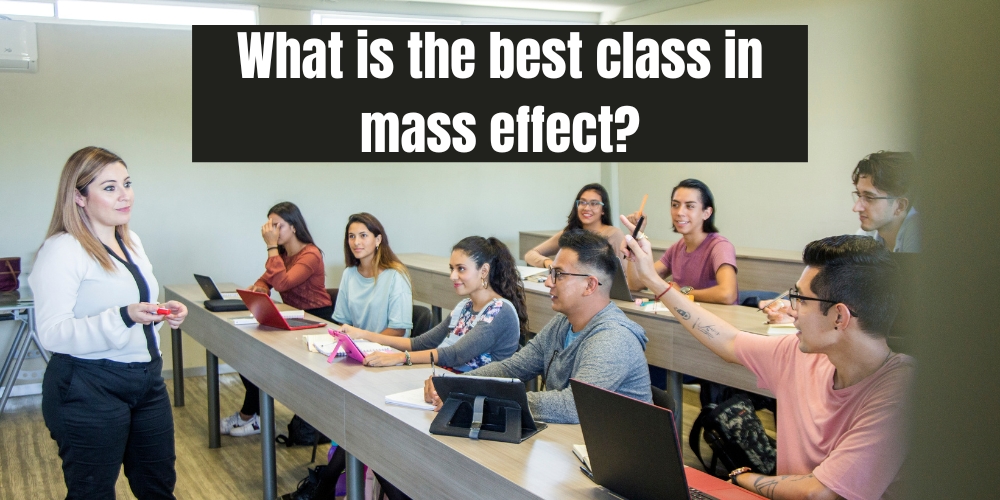Selecting a class is relatively easy in the Legendary Edition of the Mass Effect trilogy. Still, new and seasoned players may need help deciding on a class for their custom Shepard for fear of missing out on something important or making things more difficult for themselves.
There are many ways in which your class selection will affect your gameplay, but the good news is that Mass Effect doesn’t have any “bad” classes. Since you can switch classes at the beginning of every game, you don’t have to play the class you ultimately feel is the “wrong” one. The best class is still the one you want to play the most.
But if you’d like a somewhat more thorough rundown of Mass Effect’s six character classes and their roles in each game, here it is:
Which character classes are available in the Mass Effect Legendary Edition?
Character classes in Mass Effect Legendary Edition are the same as in the trilogy’s initial release.
Six character classes and three specializations are available in the games. Though their specific skills vary slightly between games, these six classes remain the same in all three.
When you try to create a character in Mass Effect 1, you’ll see the descriptions of each class as follows:
Class Adept:
Adepts are experts in Biotics. Thanks to upgradeable implants, they may employ their biotic powers to shield the squad, destroy or turn off foes, and lift and throw things. Adepts are specialized in pistols and are limited to wearing minimal armour.
Class of Soldier:

“Combat experts, soldiers are perfect for the front lines of a gunfight. In addition to having better health, soldiers can train to utilize heavy armour, specialize in using any weapon, and begin with the ability to wear medium armour.
“Engineers are tech specialists,” says the engineer class. They can destroy enemy weapons or shields, fix or modify technological equipment, decipher security systems, heal their team, and more with the holographic omni-tool. Engineers are experts with firearms and are limited to wearing minimal armour.
Leading class:
“Vanguards are fighters with biotic powers. They are particularly lethal up close and use a combination of Biotics and weaponry to defeat their adversaries. They wear medium armour and specialize in pistols and shotguns.
Class of sentinel:

Sentinels have both biological and technological skills. Though they can also deploy tech or biotic strikes to disrupt opponents, their primary means of defending allies are their advanced healing capabilities and biotic talents. Compared to other classes, they are more proficient in technology and Biotics, but at the price of combat. Sentinels do not train to use specialized weapons and are limited to wearing minimal armour.
Class of infiltrators:
“Infiltrators specialize in long-range enemy killing or disablement by combining combat and tech skills.” Trained in using omni-tools, infiltrators prioritize offensive and decryption skills over healing.
Which specialization exists?
Understanding the three specializations is crucial to selecting the character class that best fits your play style.
The most apparent specialization is combat, but you should still pay attention to it. Combat-focused characters are more proficient with the game’s arsenal of weapons. Better base armour and enhanced health are available to characters in any combat expert class.
Additionally, tech is relatively self-explanatory. Tech specialists are less hands-on than Combat specialists but are nevertheless valuable for medical and other critical support tasks that call for a PhD or two. They excel at ranged attacks in particular. They may launch a potent onslaught with their unique ability to interfere with enemy technology. Thus, they are by no means helpless.
Although comparing Biotics to magic in Mass Effect oversimplifies the situation, there are unavoidable parallels. Thanks to their cyberpunk-style implants that harness their innate psychic abilities, biologics experts can use their capabilities to back their unit or take the lead in combat.
Should we make changes in ME2 and ME3 ?
In all Mass Effect Legendary Edition games, changing your class requires starting over from scratch.
You can select a different class when importing your Mass Effect save into Mass Effect 2 or Mass Effect 2 into Mass Effect 3.
The specifics of the classes differ slightly throughout the games. Later instalments of the trilogy provide a few adjustments to each class’s functionality, primarily in the form of new skills.
Tech specialists acquire more complex gadgets like drones and cloaking devices; combat specialists have quality-of-life upgrades like improved precision and slow-motion bullet time while lining up their bullets; biotics users gain more powers, emphasizing their quasi-supernatural skills.
As usual, the decision ultimately boils down to personal taste. If you find a class in ME2 or ME3 that you think you’d prefer, or if you feel like a change, there’s no reason not to try it out. When you begin a new section of the trilogy, switching classes does not have any consequences.
But none of the classes are particularly noteworthy in the trilogy’s games.
Which character class works best with Insanity Difficulty?
The Mass Effect trilogy of video games includes Insanity Difficulty in all three. To make your life more complex, the foes on this most excellent difficulty level have far greater health, attack accuracy and reaction times, immunities, weaponry, and anything else they can think of.
To obtain every trophy and accomplishment in Mass Effect Legendary Edition, you must finish all three games on Insanity Difficulty. During an Insanity Difficulty playing, you may discover that your priorities change while selecting a class. You may want to consider switching up your class if you plan to drastically modify your play style on Insanity Difficulty.
In the end, though, it’s crucial to remember that, even on Insanity Difficulty, your tastes and play style should guide your decisions for character classes. It is possible to finish the game on this difficulty level with any of the classes, and your chances of succeeding (and maintaining interest!) are higher when you play in a class you are comfortable with and love.
It may seem like adding more complexity to the most complicated assignment in the game to take on this challenge as an Adept or Engineer, but if your chosen play style is based mainly on Biotics or Tech, you should go for it.
As Mass Effect develops, each class has unique benefits.
Though they practically throw themselves at the opponent, vanguards are a remarkably delicate class. Mass Effect 3 has the best and tightest gameplay of the trilogy, so that’s where it gets fantastic. Vanguard maybe my favourite class if you plan to play the same Shepard in all three games when this version comes out. However, I liked Mass Effect 2’s Soldier mode because only soldiers could wield the Revenant, a firehouse of bullets that could take out horrifying Reaper beasts. A well-armoured boss encounters them without the need to equip a heavy weapon.
However, playing Adept in ME1 was quite enjoyable, and during the three games, it didn’t get any worse; instead, other classes, like Vanguard and Sentinel, improved. In the first game, Adept was perhaps the best class for tossing objects around with biotic skills without getting killed by Biotic Charging into groups without any natural ability to defend oneself once one got there, all for the sheer joy. Later games completely resolved this problem that had not been previously fixed. Yes, I still resent Vanguards for losing out on two complete games.
Conclusion:
Due to Biotic Charge’s exhilarating gameplay and the Vanguard’s combination of combat and biotic skills that make fights both challenging and enjoyable, many fans believe that the Vanguard is the finest class in Mass Effect 2.

